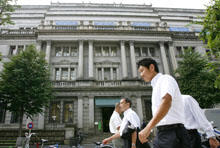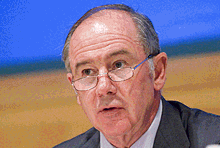
Typical street scene in Santa Ana, El Salvador. (Photo: iStock)
IMF Survey: World Growth Solid Amid Market Fears
August 23, 2007
- Financial market impact on global economy seen as manageable
- Economic fundamentals in major economies remain strong
- Market turbulence first real test of credit derivatives markets
- De Rato: " ... a moderation of global growth would have little effect on the fundamentals of the world economy" (IMF photo)
Despite recent financial market turbulence, the global economy is still expected to perform well this year, but considerable uncertainty remains about the implications of the ongoing liquidity squeeze for financial markets and for the real economy, IMF Managing Director Rodrigo de Rato said.

Tokyo headquarters of Bank of Japan, one of several central banks that injected liquidity into markets (photo: Toru Hanai/Reuters)
FINANCIAL MARKET TURBULENCE
"The principal risk is that financial market developments affect the real economy through declining asset prices, tightening financial conditions with a repricing of risk, and weaker confidence," de Rato said in a speech to a financial conference in Brazil on August 22.
"In such circumstances, the concern would be that consumption could suffer in the United States, producing knock-on effects elsewhere. However, to the extent that financial conditions return to normal, we believe these risks will likely be mitigated, as most corporations remain highly profitable and household finances continue to be sustained by solid employment growth. Thus, the U.S. economy should continue to grow at a moderate pace this year," said de Rato.
Liquidity squeeze
Losses emanating from the U.S. subprime mortgage market have hit the balance sheets of banks and funds around the world in recent weeks and created the worst credit and liquidity squeeze in world financial markets in a decade. Central banks in several major economies have stepped in to provide liquidity to the markets.
De Rato, attending the Third International Derivatives and Financial Market Conference in Campos do Jordão, Brazil, said the bout of market turbulence represented the first real test of structured finance and related credit derivative markets and the complex instruments being traded in these markets.
The IMF Managing Director said at the opening of the conference that these markets, which have grown rapidly in recent years, have brought many benefits. By enabling market participants to better diversify risk, the cost of credit has been lowered world-wide, and a much larger segment of the population has been able to access credit, providing an important boost to global growth.
"Fortunately, a number of central banks throughout the world have been quick to react with significant injections of liquidity"
However, some participants had underestimated the risks related to both the liquidity and the pricing of these complex instruments.
"Deepening concern about the situation of a number of financial institutions exposed to these risks has had a significant impact on the liquidity of the interbank markets," said de Rato, a former Spanish Economy Minister. "Fortunately, a number of central banks throughout the world have been quick to react with significant injections of liquidity, with an aim to restoring orderly market conditions. Nevertheless, looking forward, there remains considerable uncertainty about the implications of the ongoing liquidity squeeze for financial markets and for the outlook for the real economy more broadly," he stated.
Strong fundamentals
Despite the market turbulence, de Rato said the global economy remained in relatively good shape.
Economic fundamentals, both in the large industrial economies and in most major emerging economies, remained strong. "However, the balance of risks has tilted to the downside when compared with a few months ago, reflecting the impact of the recent turbulence in financial markets. These risks bear close watching," de Rato stated.
He noted that global expansion was not just powered by the United States. Despite some slowing in the second quarter, growth in the euro area and in Japan was expected to continue at a solid pace of around 2½ percent, and major emerging markets like China and India will grow at close to or above double digit rates, thereby increasing their contributions to global growth. "Indeed, China will be one of the main engines of world growth this year," de Rato stated.
Several of the major emerging markets have strong economic fundamentals, including current account surpluses and lower debt levels. More flexible exchange systems and the ability to issue debt in local currency have reduced two sources of vulnerability, compared with previous episodes of financial market strains. "There is clear evidence of this at present," the Managing Director said.
Risk reappraisal
"What we see so far in financial markets is a reappraisal of risk. This is a natural response—particularly following an extended period of rather exuberant credit markets—and this reappraisal, in the long run, is good for financial stability," de Rato said.

De Rato: " ... a moderation of global growth would have little effect on the fundamentals of the world economy" (IMF photo)
"This does not mean that market adjustments do not present medium-term risks. The troubles in the U.S. nonprime mortgage market may further distress the holders of such mortgages and their creditors when adjustable rate mortgages are reset over the remainder of this year and next," he noted, adding that some problems related to exposures to U.S. credit markets have recently surfaced in markets outside the United States.
The liquidity support provided by various monetary authorities had been an appropriate response to an unwarranted and temporary loss of confidence in money markets, related to uncertainties over the extent and distribution of credit-related losses, de Rato said. "We believe that liquidity conditions will return to normal as information problems diminish and transparency improves. Although it is too early to assess the final impact of this episode of financial turbulence on real economic growth, a moderation of global growth would have little effect on the fundamentals of the world economy."
He said the spillover of credit market turbulence to noncredit markets—including currencies and equities—has so far been manageable, helped by solid fundamentals not only in more developed markets but also in emerging economies. "And, if history is any guide, even when shocks in one region spill over into other markets, these effects are typically short-lived and sometimes even provide a necessary wake up call to investors who may be underestimating the risks," he added.
Long tail
In Washington, IMF First Deputy Managing Director John Lipsky said in a U.S, television interview that the credit problems would take some time to be completely absorbed. "The subprime area in the U.S. is undoubtedly going to have a fairly long tail. It will take some time to restore complete health to the housing sector, but at the same time the global economy continues to look quite solid and quite healthy."
Policymakers would remain vigilant to make sure that market liquidity is maintained and restored if necessary and that volatility returns to more normal levels. "I'm sure that there will be conclusions drawn about structural changes to increase the transparency of financial markets to ensure greater confidence in the performance of these new risk transfer instruments in the future," Lipsky added.
Need for transparency
At a press conference with Brazilian media, de Rato emphasized the need for good regulation and transparency of financial markets. "Financial markets are most likely to deliver on the promise of growth and stability if they are transparent and well regulated," he stated.
The IMF has been active in this area for some time. The Managing Director cited as an example that for the past decade the IMF has taken a leading role in promoting statistical transparency regarding both economic and financial information. "Our financial sector assessment programs (known as FSAPs) are well advanced, and we are actively engaged with regulatory bodies to help determine appropriate levels of disclosure and public information," he stated. Also, the special data dissemination standards (SDSS) initiative spearheaded by the Fund had contributed greatly to enhanced data transparency.
"Working together with our global membership—including both advanced and emerging economies—we will be taking stock of recent developments in order to help design and implement improvements in both public policies and in market transparency standards," de Rato added.


